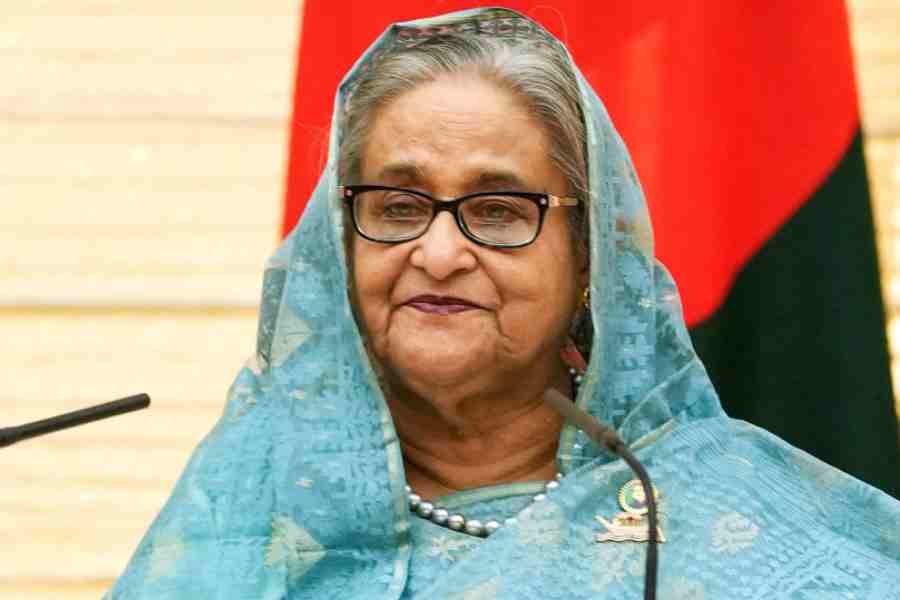Somalia, Nigeria and now Bangladesh.
The US government’s attempts to use punitive measures on people undermining the democratic election process — by imposing visa restrictions — reached the subcontinent on Wednesday with the state department announcing a new visa policy for Bangladesh barely seven months before the country’s next general elections.
The crux of the new rules — announced by US secretary of state Anthony Blinken — is that the US will deny visas to individuals, from law enforcers to political leaders, undermining the democratic election process in Bangladesh.
“They have clubbed us with Nigeria, Somalia. This is not only ridiculous, it’s an insult to Bangladesh... I simply can’t digest it,” said Nayeemul Islam Khan, a senior journalist credited as the founding editor of several newspapers.
In their official reaction, the government and the ruling Awami League did not express any discontent and reiterated that the Sheikh Hasina administration was committed to holding a free and fair election. The state department also conveyed that it was “heartened” by the reaction from Dhaka.
Off the record, however, several ruling party insiders echoed Khan’s feelings. They referred to how the netizens went after Blinken, who made the announcement, using his Twitter handle to ask why the US was not taking similar measures against Pakistan or Thailand. Questions on whether the US was plotting a regime change in Dhaka or whether it had the moral authority to talk about a “fair election” after destabilising nations were also doing the rounds in Dhaka’s diplomatic and political circles.
Krishnan Srinivasan, former Indian foreign secretary, echoed similar feelings and termed the US decision ridiculous.“During the last two elections (in Bangladesh), the US were huffing and puffing... It seems, this time they mean business,” said the former diplomat, referring to the US activity in Dhaka ahead of the hustings in 2014 and 2018 that was perceived to be favouring the Bangladesh Nationalist Party (BNP), the main Opposition force.
India, on the other hand, is considered pro-Awami League.
Srinivasan also questioned the US strategy of inflicting “punitive action” to improve the election system and argued that the Carter Centre philosophy, founded by former US President Jimmy Carter, of hand-holding the countries in improving their electoral system was a much more effective tool.
Though Blinken and his colleagues in the state department have explained that the new visa policy will apply to all parties and that the sole US interest is to promote democracy, not everyone is convinced.
“The US sent the seventh fleet during the Liberation War (of 1971) in support of Pakistan... Their senior diplomats have always hobnobbed with the BNP. We have diplomatic and business ties with the US, but we see them with suspicion,” said the politician who refused to be identified.
Though anti-US rhetoric is an integral part of politics, the ruling party politicians are cautious this time for two reasons: First, they cannot afford any adverse action on the visa front and second, the US is the most important market for readymade garment exports valued at over $20 billion last fiscal.
This dependence on the US has been the main reason behind some of the recent moves by the Hasina government — like allowing US companies to engage in oil exploration in the Bay of Bengal and announcing its Indo-Pacific Outlook — that may not have amused Beijing, Dhaka’s other key partner.
“The US seems to want more as they are keen on a naval base in the Bay of Bengal,” said a source in India, referring to the tightrope walk facing Hasina who cannot afford to annoy Beijing and New Delhi.
The Indian foreign ministry establishment has not officially reacted to the new visa policy, but sources said that the move is not good news as it has created “a sudden uncertainty” ahead of the election in which Hasina, India’s trusted friend, will try to be re-elected for the fourth time in a row.
With Prime Minister Narendra Modi’s state visit to the US lined up in June, New Delhi is likely to steer clear of the Dhaka-Washington tug-of-war but observe its impact with keen interest, a source said.
According to a retired Indian Foreign Service officer, the new US visa policy will have a major impact on the election. “This is likely to result in some improvement in the electoral system in Bangladesh... The last two elections were pretty flawed as the dice were heavily loaded in favour of the Awami League,” he said.
Khan, known for his leanings towards the incumbent government, also hoped that the performance of the national election will improve this time.
The BNP, which has been threatening to boycott the polls unless its demand of a caretaker government is met, has officially welcomed the US move but is yet to spell out its stand in taking part in the polls.
"In Bangladesh, we are deprived of our democratic rights as people didn't get a chance to vote in the last two elections... We believe that free and fair polls cannot take place without a caretaker government and we will stick to our demand," said Mirza Fakrul Islam Alamgir, secretary general of the BNP.
For a change, he echoed the ruling party leaders and said: "This new visa policy is not at all an honour for Bangladesh, it's sad." He, however, held the ruling party responsible for the US action.










